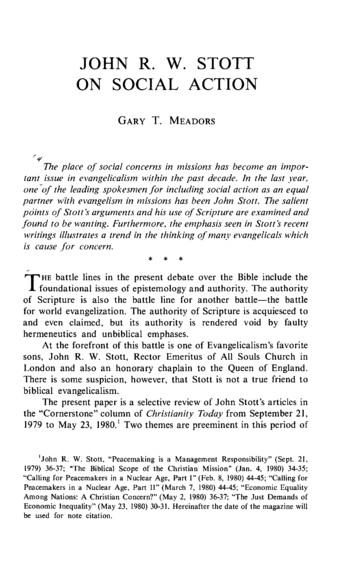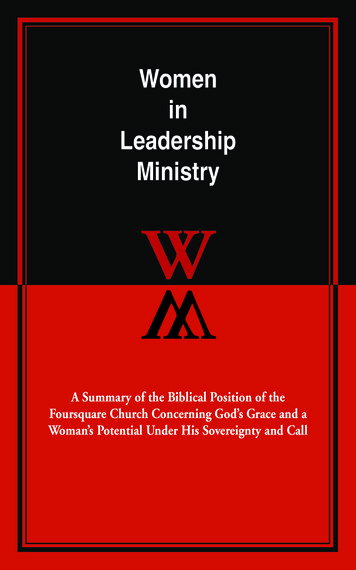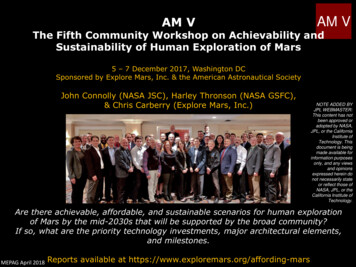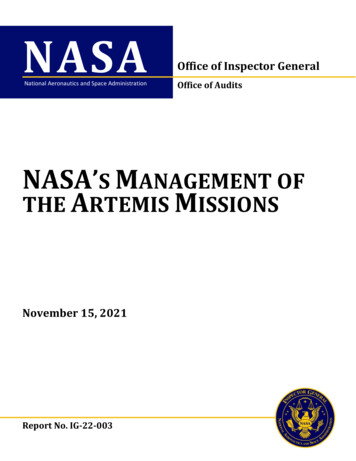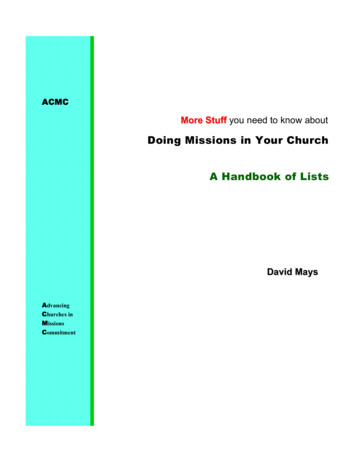
Transcription
ACMCMore Stuff you need to know aboutDoing Missions in Your ChurchA Handbook of ListsDavid MaysAdvancingChurches inMissionsCommitment
More Stuff you need to know aboutDoing Missions in Your Church2ACMCMore Stuff you need to know about4201 Peachtree RoadNorthSuite 300Atlanta, GA 30341Doing Missions in Your Churchwww.ACMC.orgA Handbook of ListsCopyright 2002by ACMC andDavid MaysAll rights reservedPortions of this bookmay be reproducedwith priorpermissionof ACMCDavid MaysSend yourimprovements,additions, andcomments toDavid Maysdavidmays@acmc.orgAdvancingChurches w.davidmays.orgdavidmays@acmc.orgrev. July 2002
More Stuff you need to know aboutDoing Missions in Your Church3WELCOME to the “More Stuff” book.More Stuff you need to know about Doing Mission in Your Church is the second volume ofan encyclopedia of all the things you wanted to know about doing missions but didn't know whomto ask. It is a compilation of one-page lists, outlines, forms, and resources covering everythingfrom Short Term Missions Policies to Missions Pastor Job Descriptions.It is meant to be a reference book for local church leaders and those helping churches in missions.I hope you will: Copy the diskette on your hard drive Modify, print out and copy pages as needed for your congregation or organizationPlease don’t: Make copies of the diskette for others Give away or sell the diskette or printed copies to othersIf you would like to provide copies of this diskette to churches in your denomination or to othersas gifts, please contact me for permission and a fee schedule.To order additional diskettes of the ‘More Stuff’ book, please send a check for 10 each plus 2for shipping to ACMC, Box 221, Brownsburg, IN 46112. Ask for the “More Stuff” diskette andinclude your mailing address.May God help you to use this and other good missions tools to make world evangelism central inyour organization.David MaysHere is what some have said about the original “Stuff” book:"Just the index is worth the price of the diskette. It tells you what you need to know that you didn't know enoughto know you didn't know, and best of all it gives you the answers! A winner!” John Gration, missions professor“For churches seeking to be effective in missions within the current context, the best new resource is Stuff youneed to know about DOING MISSIONS IN YOUR CHURCH. It offers concise, contemporary and practicalwisdom on 86 key church-mission issues.” Carol Wilson, MGS Servant, p. 4 (Moody Graduate School)“While I was scanning the disk of your ‘Stuff’ Handbook on my computer, I received two phone calls forinformation. For each request I was able to answer it by sending a page from the Handbook.” Mike Pollard,Arab World Ministries“It’s absolutely fantastic. I think it’s one of the greatest compendiums [sic] of information we could give topeople.” Mark Struck, United World Mission“I have just finished reading through your handbook. I wish we had had something like that when I was on themissions committee at Winnetka Bible Church. It is excellent.” Cindy rgdavidmays@acmc.orgrev. July 2002
More Stuff you need to know aboutDoing Missions in Your Church4ContentsFoundationsCommunication5. Missions Definitions6. Missions Glossary7. Basic Biblical Missions Principles8. Quotes on the Church’s Global Responsibility9. World Evangelism and the Purpose of the Church10. Description of a Missions Mobilized Church11. Missions Scope and Boundaries12. Recurring Themes in Global-Minded Churches13. Missions Priority Scale14. First Steps in Missions for Your Church43. Missions Bulletin Board Tips44. Missions Conference – Alternative Names45. Missions Education46. Trends – Culture and Church47. Trends – Missions and Church48. Missions – What’s ‘Up’ and What’s ‘Down’49. Web Security for MissionariesLeadership15. Missions Ministry Purpose, Vision, Values Statements16. Global Vision Diagram17. Vision Discovery Process18. Vision Discovery Worksheet – Our Church19. Vision Discovery Worksheet – Our World20. Proposal for a World Evangelism-Driven Church21. Balancing Domestic Ministry and International Missions22. Ministry Leader World Evangelism Survey Form23. Growth Stages of an Intentional Disciple-Making ChurchManagement24. Missions Team Responsibilities25. Global Outreach Team Expectations26. Missions Team Member Job Description27. Missions Team Mistakes28. The Old Paradigm - How we always did it.29. Local Church Missions Paradigms30. Top Twenty Tough Missions Questions for the Church31. One-Page Missions Policy (Sample)32. Missions Values33. Missions Strategy Overview34. Missions Strategy Criteria35. Missions Strategy Checklist36. Missions Strategy Examples37. Church-Agency Partnership AgreementPrayer38. How to Pray for the World39. How to Pray for the Persecuted Church40. How to Pray for Short-Term Missionaries41. Prayer Support Teams for Your Missionaries42. Prayer Room for Your Missions al Involvement50. Faith Promise – What It Is51. Faith Promise – How To Implement It52. Simple Lifestyle to Provide More for Missions53. Perspectives on Giving to Missions54. Small Group Outreach Survey Form55. Mission Trip Funding Options56. Biggest Mission Trip Mistakes - Preparation57. Biggest Mission Trip Mistakes - Ministry58. Mission Trip Follow ThroughMissionaries59. Qualities for a Potential Missionary Candidate60. Questions for Considering a Missions Agency61. Missionary Candidate Mentor’s Checklist, Page 162. Missionary Candidate Mentor’s Checklist, Page 263. Missionary Intern Job Description64. How to Interview Missionary Candidates65. Questions for the Mission Team to Ask Missionaries66. Questions for Friends and Supporters to Ask Missionaries67. Questions for Missionaries to Have a Ready Answer68. How to Really Support Your Missionary69. Missionary Care Teams70. Missionary Contract71. How to Say “No” to Missionary Applications72. Missionary Burnout – Cause and CuresResources73. ACMC Resources74. Missions Education Resources75. Sources of Children’s Missions Resources76. Best Sources of Missions Resources77. ACMC Conference Follow Through78. Selected Missions-Related Web Sites79. Church Web Sites with Good Missions Information80. Missions Pastor Course Proposalwww.davidmays.orgdavidmays@acmc.orgrev. July 2002
More Stuff you need to know aboutDoing Missions in Your Church5Definitions: What is Missions? What is a Missionary?“Missions is the worldwide enterprise of makingdisciples of the nations that falls outside the normaloutreach responsibilities of the local church.” ChurchMissions Policy Handbook, ACMC, 3rd edition“Missions is the method by which, through humanagents, God extends his kingdom among men until itshall come to be universal.” W. O. Carver, All theWorld in All the Word“Mission is the sending across cultural barriers byChrist through the church evangelists whose primaryfunction is to make disciples of Jesus Christ byproclaiming the good news about Jesus.” RobertReeves, What the Bible Says About MissionsMissions is “an enterprise devoted to proclaiming theGood News of Jesus Christ, and to persuading men tobecome His disciples and dependable, reproductivemembers of His Church.” Donald McGavran,Understanding Church Growth“Mission is the intentional crossing of barriers fromChurch to non-church in word and deed for the sake ofthe proclamation of the Gospel.” Stephen NeillMissions is “the intentional, sacrificial penetration ofmajor human barriers to plant communities ofresponsible disciples of Jesus Christ among groups ofpeople where none have existed before.” DavidBryant, In the Gap“When a person is ‘sent out’ beyond the borders andinfluence of the local church to make disciples, that ismissions.” Woody Phillips, Let’s Define Missions“Missions is a specialized term. By it I mean thesending forth of authorized persons beyond the bordersof the New Testament church and her immediategospel influence to proclaim the gospel of Jesus Christin gospel-destitute areas, to win converts from otherfaiths or non-faiths to Jesus Christ, and to establishfunctioning, multiplying local congregations who willbear the fruit of Christianity in that community and tothat country.” George Peters, A Biblical Theology ofMissions“Missionaries are Christian workers who engage incross-cultural ministries with evangelistic goals.”C. Peter Wagner, Frontiers in Missionary StrategyMissionaries are “those who leave their home areas totake the gospel cross-culturally.” David Harley,Preparing to Serve“A missionary is a prepared disciple whom God sendsinto the world with his resources to make disciples forhis kingdom.” Ada Lum, A Hitchhiker’s Guide toMissionsA missionary is “a ministering agent, selected by Godand His church, to communicate the gospel messageacross any and all cultural boundaries for the purposeof leading people to Christ and establishing them intoviable fellowships that are also capable of reproducingthemselves.” Ray Tallman, Introduction to WorldMission“A Christian missionary is a person whose passion isto make the Lord Jesus known to the whole world. Ibelieve that ‘being a missionary’ in the truest sense ofthe word is taking the Gospel where it has never beenbefore, or at least to a different culture or a differentlanguage group. A true missionary is someone whowill risk everything for the sake of the lost of theworld.” Keith Green“Cross-cultural church planting missionaries aremessengers sent by their respective churches to placeswhere there is no Christian witness. They live anexemplary life and communicate the gospel in waystheir new neighbors can understand. Their aim is tosee conversions to Jesus Christ. They teach believersto obey all of Christ’s commandments. The final goalof their missionary activity is a body of obedientChristian disciples who are able to carry on the work ofevangelism and discipleship among their own peopleand who are eager and able to reach other peoplesalso.” Robert W. Ferris, ed., Establishing MinistryTraining, p. 33“When everything is mission, then nothing is mission.” Stephen davidmays@acmc.orgrev. July 2002
More Stuff you need to know aboutDoing Missions in Your Church6Missions Glossary10/40 WindowAn area stretching across North Africa and Asia bounded by the 10 degree and 40 degreenorth latitudes representing the greatest geographical challenge to the Gospel. Home of theworld’s three great non-Christian religions, and the majority of the poorest and unreached.CandidateOne who has been accepted by a church or a mission organization for missionary serviceChurch PlantingThe process of bringing people to Christ and forming them into a local congregationClosed CountryA country that does not receive individuals entering as missionariesClosureCompletion or fulfillment of the Great CommissionContextualization The attempt to accurately communicate the gospel in ways that are reasonable, understood,and natural to another culture.Creative AccessVarious means of reaching people for Christ in “closed” countries; often used as analternative, more positive way of describing a “closed country”Cross-culturalAcross a cultural barrier, usually across barriers of language, values, symbols, and habitsDependencyThe result of doing for others what they could learn to do for themselves, thus deprivingthem of opportunity to growDeputationDeveloping financial support from churches and individuals to support the missionary’sministryFurloughA time period set aside from regular missionary work to return to the home country forstudy, refreshment, reporting, personal business, and support raising, commonly calledHome AssignmentGreatCommissionChrist’s command to disciple all nations, usually referring to Matthew 28:18-20IndigenousNatural or native to the people in their own culture or contextNationsEthnic, cultural, or people groups. Derives biblically from the Greek ‘ethna,’ (“ethnic”)NominalismClaiming a religious faith but not living itPartnershipTwo or more organizations working together to achieve a common objectivePaternalismTreating people and institutions of other cultures as inferior or childlikePeople GroupSee Nations, aboveReentryReturning to one’s country or culture of origin, often with negative emotional symptomsSyncretismThe unbiblical blending of true religion with false; mixing of religions, or worldviewsTEE(Theological Education by Extension) – a means of Christian education and training inwhich a missionary or Christian educator circulates among Christian workers on location,teaching and leaving materials and assignments to be completed between visitsTentmakingDoing missionary ministry while working in a non-religious occupationTriumphalismBelieving we can convert the world on the basis of human resourcesUnreachedA people group judged to have inadequate Christian resources to evangelize itselfWorldviewThe way a people look upon itself and the universe, the way it sees itself in relationship to allelse. Four main elements: mankind, nature, the supernatural, and time. Archetypes:secularism, animism, gdavidmays@acmc.orgrev. July 2002
More Stuff you need to know aboutDoing Missions in Your Church7Basic Biblical Missions Principles Bridge – Acts 13:1-4 Barnabas and Paul choosing to go to Cyprus first1. Continuity2. Connections3. CommitmentMissionary Care – Acts 13:13. John Mark leaving the missionary team1. Adequate preparation of candidates2. Adequate safety net3. Restored relationship is the goal, 2 Ti 4:11Strategy – Acts 13:14. Going into the synagogues: Utilizing common ground to preach the Gospel1. Heritage of the missionary counted2. Cultural sensitivity3. Respect for the target group“Z Thinking” – Acts 14:23. in context Indigenization,Intentionally giving leadership to the nationals as quickly as possible1. Give away leadership2. Give high expectations3. Give way and leaveAccountability – Acts 14:27-28. Missionaries returning to their sending church and reporting1. Returning2. Reporting3. RefreshingRecruitment – Acts 16:1-3. Raising up missionaries from the church,Timothy is commended by the church and taken by Paul1. Draft – leadership being proactive in selection for ministry2. Farm team system – increasing equipping for ministry3. Training and orientation assured by the churchAllocation – Acts 16:6-11. Reflections on “the missionary call”Paul’s Macedonian Vision is unique; “the call” process is simpler and sensible1. Discussion – Is it from God?, Is it intended for us?2. Conclusion – “knitting together”3. Action – immediate and completeSaturation – Acts 19:8-10. Equipping for long-haul penetrationPaul’s establishing a training program which impacted “all Asia”1. Disciples – avid learners2. Curriculum – implied in establishing a “school”3. Completion – intentional and natural result of the strategyCompletion – Acts 20:1-17. Paul’s release of ministry to the planted churchesConscious and ceremonial turnover of responsibilities1. Divesting2. Directing3. DepartingFinal Charge – Acts 20:17-38. Paul’s legacy is more than doctrinalPaul’s soliloquy to Ephesian elders highlights core philosophy of ministry1. Work ethic2. Attitude3. ResponsibilitySource: David Meade, ACMC, pastors’ mission trip to Turkey, avidmays@acmc.orgrev. July 2002
More Stuff you need to know aboutDoing Missions in Your Church8Quotes on the Church’s Global Responsibility“His purpose for the church was to continue what He began with Israel. God wants to redeem a lost world.” HenryBlackaby, Fresh Encounter, p. 68“I define ‘successful’ as fulfilling the Great Commission. Any church that is not obeying the Great Commission isfailing its purpose, no matter what else it does.” Rick Warren, The Purpose Driven Church, p. 64“The church’s mission is the Great Commission.” Aubrey Malphurs, Ministry Nuts And Bolts, p. 63“No pastor is fully obedient to Christ if he does not lead his church to pursue the Great Commission by makingdisciples both locally and around the world.” Bill Lawrence, Effective Pastoring, p. 53“Jesus himself gave us the mission to ‘make disciples’ of people and to obey his entire teachings.” “What thechurch urgently needs to do is establish the biblical mission of seeing Christ formed in individuals as thefoundational mission of biblical community.” (66) “ the common mission is to see individuals become fullydeveloping followers of Christ.” (67) Randy Frazee, The Connecting Church, p. 67“I believe all Christians and all congregations are to be involved in ministry in their locality, in their nation, inneighboring nations, and on the spiritual frontiers of this earth. And I believe this ministry is to happensimultaneously – we don’t have to win everyone at home before we step out of our own neighborhoods.” HowardL. Foltz, For Such a Time As This, p. 30“Christ’s commission is for the whole church to take the whole gospel to the whole world! Every member is calledto participate in mission; therefore, we need to provide a broad range of opportunities.” Art Beals, When the SaintsGo Marching Out, 138“We witness because we worship and we worship by our witness.” “Because we love the Lord we reach out inworld missions. Worship is the driving force. True worship yields world missions. Missions is simply theevidence of worship in action.” “Worship launches mission outreach, and worship is the outcome of this outreachas new believers join in honoring our Lord.” “Our assignment is big. We are called to join in the chorus of natureto proclaim the glory of God in all the earth, to point the peoples of the world to their Creator .” Ron Blue,Strategies for Outreach in the 21st Century, pp. 3, 5, 33“The church is to be the means of the final achievement of God’s eternal purpose: ‘in order that the manifoldwisdom of God might now be made known through the church’ (Eph. 3:10).” “God has seen fit to make his peoplepartners in the world of world redemption.” H. Cornell Goerner, All Nations In God’s Purpose, pp. 137-8“The Church, wherever it is, is not only Christ’s witness to its own people and nation, but also the home-base for amission to the ends of the earth.” Leslie Newbigin, A Word In Season, p. 2“People’s participation in global missions is waning. While many Americans have adopted a global mind-setwithin the past decade, American Christians are increasingly devoted to domestic ministry and causes to theexclusion of international ministry opportunities. Even though we continue to give massive sums of money toreligious activity, the share assigned to overseas ministry is in decline.” George Barna, The Second Coming of theChurch, p. 223“The whole purpose of creation, the existence of the universe and of history is that those who believe in him shouldbecome an Eternal Companion to his Son as his Bride and to share his throne and authority. That Bride is to comefrom every part of the human race.” Patrick Johnstone, The Church is Bigger than You Think, p. vidmays@acmc.orgrev. July 2002
More Stuff you need to know aboutDoing Missions in Your Church9World Evangelism and the Purpose of the ChurchWe commonly think of the purpose of the church as consisting of three dimensions, relationships orresponsibilities: upward in worship, prayer, listening, obedience inward in nurture, edification, care fellowship outward in service, ministry, evangelism, missionsBut are these complete in themselves or do they individually and together focus on something bigger? Somethingmore comprehensive?The church has historically seen its ultimate purpose as God’s glory. Many today seem to say that the primarypurpose of the church is worship. However, when we speak of worship we can get fuzzy-minded. Worship is morethan what we do when we gather at church and sing praises. It is possible to worship God with our lips while ourhearts are far from him. I like to think of worship as honoring God. Then we can think of it terms of ourrelationships with God. We might compare it to a child honoring his parents. He honors his parents not just whenhe says good things to them or about them. He honors them when he incorporates into his life his parents' ideals,values, and purposes. That truly honors them. We worship God when we live for what He lives for, his glory - in allthe earth. We worship God when we align our lives with His desire to be worshipped—by all peoples.Therefore, when I think of the purpose of the church as God's glory, it gives me perspective if I think of it as Hisglory in all the earth. When I think of worship, it gives me perspective if I think of it as the worship of God amongall peoples. If the purpose of the church (the why question) is God's glory, then the mission of the church (what thechurch is to do) is to see to it that he is worshiped among all peoples. Therefore, I conclude, as do many writers,that the Great Commission is the marching orders for the local church.It seems, however, that in most churches the "mission" has slipped down to become one of the programs. And thatis so prevalent that it is very difficult to imagine what a church would like if it were restored to the level of apurpose. Programs come and go. Programs are optional. They are meant to fulfill purpose. Purpose is enduring.There are two important implications here.1. Purpose belongs to every department and every person in the organization. Therefore world evangelism is aproper component, part of the plan and operation, of every department and ministry. Missions education(input) and/or missions involvement (output) is properly part of every segment of the church.2. The purpose of the whole is the purpose of the parts. Thus the unifying theme or overarching purpose ofeach ministry or department is world evangelism. It is not just an add-on, but the direction-giving focus,the guiding principle of every department.Some possible conditions for implementing the above principles might be the following:1. Every staff member and lay leader understands that the overarching purpose of his/her ministry is to make themaximum impact on the world, the evangelism and discipleship of our world and the larger world.2. Every program is designed to make the maximum impact on world evangelism.3. Every program or ministry is evaluated regularly in regard to its impact on world evangelism.4. Every leader is evaluated regularly in regard to the above.5. Every staff member is hired with this understanding.Source: David Mays. This concept has been expanded and published in World Christian Magazine, June avidmays@acmc.orgrev. July 2002
More Stuff you need to know aboutDoing Missions in Your Church10Description of a Missions Mobilized ChurchA mobilized church is one that is maximizing its impact for global outreach.A mobilizing church is one that is exercising its influence to stimulate other churches to do the same.A mobilized congregation can be recognized by the following factors: Congregational Involvement. A large proportion of individuals are personally involved in local evangelismand cross-cultural outreach, going on missions trips, giving, and in other ways contributing to global outreach. Strategic Ministry. The church is supporting strategic international ministries through financial support, prayersupport, sending their own people, and support role involvement by individuals at home. Communication. Global evangelism is communicated by a multitude of means to all ages, through allministries, in ways that develop world Christians starting at all levels of spiritual development. Prayer. Congregation members regularly and naturally pray for lost people at home and abroad. They areknowledgeable of and pray for the expansion of the Kingdom, including, for example, the least reached in theworld, for people groups, mission organizations and strategies, missionaries and national workers, and forbelievers in difficult circumstances world-wide. A Global Ethos. The look, sound, feel, and touch of the church - its leadership, programs, ministry, anddecoration - convey an integrated awareness of a global church with a global purpose in a global context.Key Missions Areas for Church Mobilization Leadership (pastor, staff, committee, purpose, vision, values)Spiritual Development (prayer, commitment, education, mission trips)Management (organization, structure, strategic planning, goals, policy, procedures)Communication (worship, pulpit, education, awareness, promotion, generational and cultural issues)Congregational Involvement (local same culture outreach, local cross-cultural outreach, mission trips,supporting mission efforts caring for missionaries, innovative and personal congregational involvement) Preparing, Sending, and Supporting Missionaries, (long term and short term) Stewardship and Funding Missions (individual and congregation)Source: ACMC Field Staff Training Manual, avidmays@acmc.orgrev. July 2002
More Stuff you need to know aboutDoing Missions in Your Church11Missions Scope and BoundariesDefinitions establish boundaries. Missions committees frequently find themselves dealing with too many ministriesof too broad a scope. Further the missions fund becomes the target for every ministry that doesn’t fall logicallysomewhere else. The missions fund may become the “miscellaneous fund.” I’ve heard (this is true!) of churchesthat have funded their new organ and paved their parking lot with missions funds because they judged these wereaids to reaching unchurched people and therefore missions.In order to clarify what qualifies for missions funding and in order to limit the workload to what is most importantand manageable, it is valuable to draw boundaries. Where are the edges? What kinds of ministries, projects, andChristian workers, do not qualify for missions consideration? Your Scriptural basis for missions and your churchphilosophy of ministry will provide input for your definition.Following are some questions, which may help, determine what’s “in” and what’s “out.” After answering thesequestions, it may be possible to write a simple definition of missions for your church. If later on, you want tochange it, you may, but in the interim you avoid having missions stretched beyond recognition by the precedent ofindividual decisions.For your church, does missions include?Ministry outside the U.S. only or ministries inside the U.S. as welle.g. ministry to ethnic communities in your cityCross-cultural ministry only or same culture ministry as welle.g. ministry to college students, seminaries, retirementSpiritual ministry only or relief, development, & support ministries, as welle.g. emergency disaster relief or missionary aviationField ministry only or administration and support as welle.g. home office staff, secretariesEvangelism & church planting only or social ministry as welle.g. medical or hospital or educationSocial ministry with clear spiritual aims only or social ministry on its own as welle.g. Habitat, food pantries, crisis pregnancy centerMissionary support only or projects and organizations as wellMissionaries from your church or denomination or other missionaries as wellonlyVocational ministry only or short term and mission trips as wellWork done only by missionaries sent or work done by the congregation as wellAmerican missionaries only or partnership with national Christians, national churches andnational organizations as wellWork done only outside the church or work done by your church on your premises as avidmays@acmc.orgrev. July 2002
More Stuff you need to know aboutDoing Missions in Your Church12Recurring Themes in Globally-Minded Churches1. The church recognizes the Great Commission as the mandate for the local church2. The church recognizes the Great Commission as the mandate for all those who claim to be disciples.3. The church recognizes “the nations,” (meaning all the people groups of the world) as the intended recipientsof disciple-making efforts.4. The church recognizes that reaching the world for Christ is worship in action and truth. It honors and seeksGod’s sovereign purpose - to receive glory in all the earth.5. The church recognizes its mission involves the intentional delivery of the gospel to those who have not yetreceived it.6. The church is developing capabilities to reach people who are outside its cultural and geographicalboundaries.7. The church embraces mobilization:a. building global vision into the hearts and minds of its people,b. educating, equipping, and releasing its people make disciples of all nations, andc. resourcing and empowering its people to take steps toward fulfilling the Great Commission.8. The church mobilizes all the ministries of the church for world evangelism rather than just one team ordepartment.9. The senior pastor grasps the universal scope of God’s purposes and leads his congregation toward thefulfillment of world evangelization.10. The pastor and staff recognize that people grow in their faith as they share whatever they have with others.11. Maintaining an outward focus is continually communicated, encouraged, and reinforced by church leaders.12. World evangelism mobilization efforts receive the same high quality as other important ministries.13. Missions trips are effectively employed as a catalyst for mobilization.14. Partnerships with mission agencies, para-church organizations, indigenous organizations and indigenouschurches are recognized as crucial to healthy missions involvement and expansion.15. Churches send some of their “best” people cross-culturally.16. Church leaders enlist people in a broad range of prayer efforts, educational topics, and ‘at home’ involvementac
Reeves, What the Bible Says About Missions Missions is "an enterprise devoted to proclaiming the Good News of Jesus Christ, and to persuading men to become His disciples and dependable, reproductive members of His Church." Donald McGavran, Understanding Church Growth "Mission is the intentional crossing of barriers from





